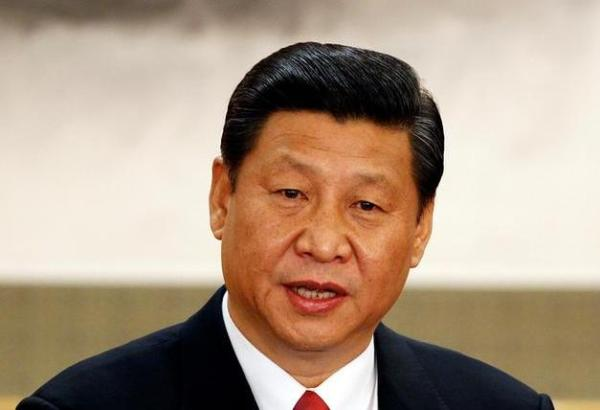
Xi Jinping secures third term as Communist Party chief, a first since Mao

Chinese President Xi Jinping on Sunday cemented his place in history as the nation’s most influential leader since Mao Zedong after being re-elected for an unprecedented third term as the General Secretary of the Communist Party of China (CPC).
The 69-year-old Xi became the first leader of the ruling CPC after founder Mao Zedong to get re-elected for a third term, with the prospect of ruling China for life. The new seven-member Standing Committee, picked by the Politburo and packed with his supporters, elected him to the top post. Xi’s third term ended the decades-old rule followed by his predecessors—barring Mao—of retiring after a 10-year tenure.
Addressing the local and foreign media at Beijing’s Great Hall of the People to herald the “Xi era,” the Chinese premier said, “Dare to struggle, dare to win, bury your heads and work hard. Be determined to keep forging ahead.”
No place for moderates
Xi was elected for the first time in 2012 and will complete his 10-year tenure this year. As expected, he was elected to the Central Committee on Saturday, to the Politburo and the Standing Committee, and then as General Secretary on Sunday. The Congress passed the key amendment to the CPC Constitution, reinforcing his core status, along with the directive that all party members must follow Xi’s directives and doctrines.
Also read: Putin says China has concerns over Ukraine war as he meets Xi Jinping
Moderates like Premier Li Keqiang, who was ranked number two, stepped down on Saturday, as the once-in-five-year Congress of the CPC elected the over-300-member Central Committee on Saturday. The Committee met on Sunday to elect the 25-member Politburo.
Xi promoted Li Qiang, Li Xi, Ding Xuexiang, and Cai Qi to the Politburo Standing Committee. Li Qiang is likely to take over as Premier from Li Keqiang. Ideology tsar Wang Huning, 67, and anti-corruption chief Zhao Leji, 65, are also part of China’s highest decision-making body.
In Mao’s footsteps
Xi’s emergence as the Chinese President, CPC leader, and head of the military, with the prospect of ruling for life, is expected to be viewed with a sense of unease and concern as the one-party state becomes a one-leader state. Xi is essentially following in the footsteps of Mao, whose extremist ideological campaigns, like the Cultural Revolution, resulted in the extermination of millions.
Also read: Xi Jinping: Quiet bureaucrat to one of China’s most powerful leaders
The well-choreographed week-long 20th Congress ended on a sordid note on Saturday with former President Hu Jintao being physically escorted out under media glare at the ornate Great Hall of People. Hu, 79, had peacefully handed over power to Xi ten years ago, in 2012. However, official media reports said he was unwell.
A different central administration headed by the new premier will formally take charge in March. The CPC Congress also approved an amendment of the party Constitution on Saturday that could further enhance Xi’s stature as China’s leader. Xi, in his brief closing remarks on Saturday, said the revision of the Constitution sets out clear requirements for upholding and strengthening the party’s overall leadership.
Shock-and-awe campaign
“I wish to thank the whole Party sincerely for the trust you have placed in us,” Xi said, promising to “work diligently” to prove “worthy of” that trust.
“We must be ready to withstand high winds, choppy waters, and even dangerous storms. Confronted with drastic changes in the international landscape, especially external attempts to blackmail, contain, (and) blockade… China, we have put our national interests first,” Xi said. He was apparently referring to the growing negativity against China in the US and the West.
Also read: Rare protest against Chinese President Xi Jinping ahead of his re-election
The Congress also appointed a new team of anti-corruption wing of CPC, called the Central Commission for Discipline Inspection (CCDI). It directly functions under Xi. According to official reports, the CCDI has punished about five million officials, including many top army generals, in the past 10 years. Critics say Xi’s shock-and-awe campaign helped him consolidate his hold on power.
Rare protests
A resolution on an amendment to the CPC Constitution adopted at the Congress said all party members should follow Xi’s leadership. The “Xi Jinping Thought on Socialism with Chinese Characteristics for a New Era is the Marxism of contemporary China and of the 21st century and embodies the best Chinese culture and ethos of this era,” the resolution said.
Another lengthy resolution on the work of the previous Congress stresses that Marxism is the fundamental guiding ideology upon which the CPC and the country are founded and thrive. It also laid out guidelines for the Chinese military.
According to the resolution, the Congress stresses that achieving the goals for the centenary of the People’s Liberation Army in 2027 and more quickly elevating the people’s armed forces to world-class standards are strategic tasks for building a modern socialist country in all respects. Praising efforts to control Covid-19, the resolution also affirmed opposition to Taiwan’s independence.
Also read: Xi Jinping insists on use of force to unify Taiwan, island responds
Ahead of the 20th Congress, Beijing witnessed rare public protests, with banners hung on overpasses of major thoroughfares, protesting Xi’s unpopular zero-Covid policy and authoritarian rule. Battery-operated loudspeakers were also hung in some places, blaring anti-Xi and anti-Zero-Covid slogans. Police quickly removed the banners and loudspeakers. Reports of similar protests came from different cities of China.
(With agency inputs)


